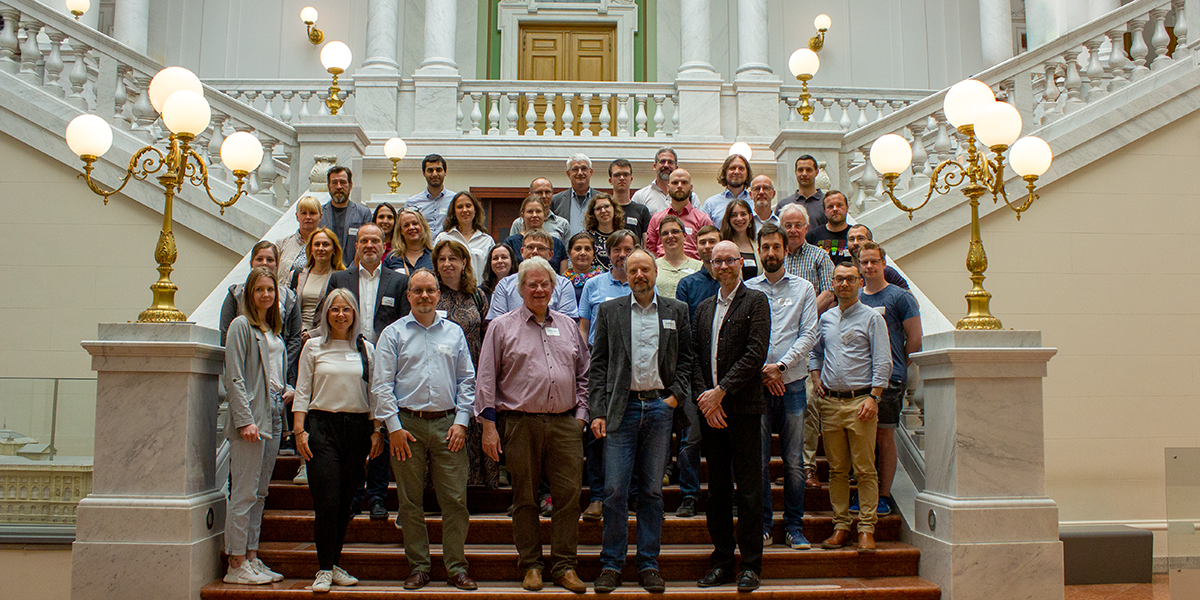
Medical Informatics Initiative infrastructure to be further expanded | SMITH Closed Meeting in Leipzig on 30 and 31 May
On 30 and 31 May, around 40 members of the SMITH Consortium met for a closed meeting at the Albertina Library of the Leipzig University. The second meeting of the year focused on the further development of the consortium’s cooperation and technical harmonisation in the Medical Informatics Initiative (MII).
“The MII has already celebrated its topping-out ceremony. Now it is time to expand the ‘house’,” said consortium leader Prof. Dr. Markus Löffler at the opening of the meeting. To this end, further steps are necessary.
For example, it is planned to etablish a main committee reporting to the National Steering Committee (NSC) of the MII and coordinating relevant, current issues. The main committee will include representatives from the consortia, use cases and Digital Hubs. The tasks of the MII main committee are to prepare the decisions of the NSC and to make recommendations for action. The focus will be on issues and developments from the use cases and the Data Integration Centres. It is desirable that, in addition to medical informatics specialists, clinical staff are also represented. In addition, Prof. Dr. Toralf Kirsten from the Leipzig University presented the concept of the MII Academy. It is designed to support clinician-scientists in working with data from the MII’s Data Integration Centres. Short videos will cover topics such as data use processes, the German Portal for Medical Research Data (FDPG) and terminologies in the MII. Starting this autumn, the videos will be available on the Leipzig University’s Moodle platform, along with other learning materials. Lecturers from all four consortia are currently being recruited.
Another key topic at the closed meeting was the German Portal for Medical Research Data, which was launched centrally by the MII coordination office in mid-May. In his presentation, Dr Frank Meineke from the Leipzig University gave a practical insight into how feasibility requests are handled. “The FDPG can already provide a relevant amount of data for studies,” Dr Meineke explained.
Marcel Klötgen, research associate at Fraunhofer ISST, concluded the first day of the meeting with a presentation on the MII infrastructure project TRANSIT. The project aims to integrate MII infrastructure components for data exchange and the provision of secondary data from medical care. This will enable data pooling across sites and distributed analysis. In addition, TRANSIT will establish Data Management Units that will bundle activities and functionalities for the provision and archiving of data sets and the results of distributed data analyses. The Data Management Units provide important services to researchers.
The second day of the closed meeting was opened by the guest speaker Dr André Sander, Head of Technical Development at ID GmbH & Co. KGaA. He presented the services that ID provides to the GeMTeX project, which was launched in early June. The company uses software to analyse documents such as doctors’ letters or prescription data in free text and extracts for example diagnoses, procedures or drug prescriptions. This results in databases that are merged by ID and later made available as a text corpus for natural language processing in the GeMTeX project.
Finally, the tools of the Data Integration Centres and the cooperation between the MII-Data Integration Centres and the Network of University Medicine (NUM) were discussed.
“We have a lively discussion culture in the SMITH Consortium. The last two days were filled with active exchange and brainstorming. We have taken another step forward,” summarised Professor Löffler in his closing presentation.
The next closed meeting will take place as an online meeting on 30 August 2023.

